The Dimension Nexus™ offers an optimal blend of high data quality, experimental versatility, and user-friendly operation, all within a compact system. It features Bruker's NanoScope® 6 controller and PeakForce Tapping® technology, providing superior functionality to other AFM systems in its class. Designed for routine applications and custom experiments, Dimension Nexus is field-upgradable, making it an exceptional choice for entry-level use or a valuable addition to advanced AFM laboratories.
Dimension Nexus: A New High-Performance Standard for Cost-Effective AFMs
Video Credit: Bruker Nano Surfaces and Metrology
Best-in-class performance
- Enables imaging with atomic- to molecular-level resolution
Ultimate versatility and value
- Offers a wide array of AFM modes for diverse applications
Programmable motorized stage
- Enhances productivity, delivering publication-ready results efficiently
Features
Provides core performance and value in every scan
The Nexus system reliably delivers highly accurate, reproducible, and publication-ready results across various sample types, catering to research and industrial applications.
Ensuring high performance
Its exceptional performance is driven by an advanced integration of state-of-the-art hardware, software, and accessories, including:
- Full suite of PeakForce Tapping modes enables the highest-resolution imaging along with precise mechanical, electrical, and chemical property mapping across diverse sample types
- Next-generation NanoScope 6 controller with unparalleled low noise, high speed, and remarkable versatility, ensuring superior performance and ease of use
- XYZ closed-loop scanner, drift-compensated bridge structure combined with an integrated granite base for small-sample applications while maintaining open access for large-sample AFM
- Extensive range of dedicated AFM Probes optimized for specific modes and samples
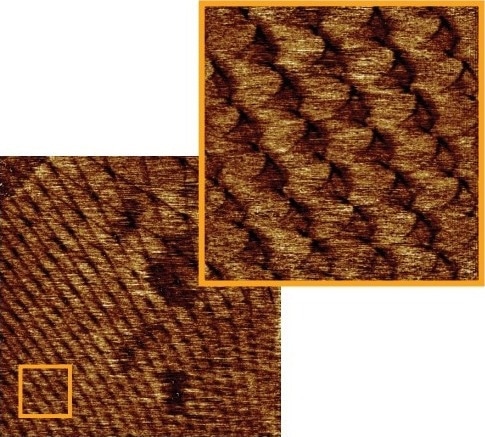
High-resolution topography images of a van der Waals heterostructure showing a moiré superlattice. Images were collected using torsional resonance dynamic force microscopy (TR-DFM) with a FESPA probe. Scan sizes 1 × 1 µm and 200 × 200 nm (orange box). Image Credit: Bruker Nano Surfaces and Metrology
Guaranteeing stability
The Dimension Nexus demonstrates exceptional stability during extended imaging sessions, exhibiting minimal drift. It is also free from scanner artifacts or tip degradation.
![[Top] Start and end of an array of 360 trenches with an overall scan size of 90 × 2 µm (16384 × 16 px) in PeakForce Tapping with an SAA-HPI probe. Critical dimension analysis showed no scanner artifacts or tip degradation over the full range. [Bottom] Trench-to-trench pitch measurements across all 360 trenches, showing near-zero deviation over the entire scan range.](https://www.news-medical.net/images/equipments/EquipmentImage_7194_45639035994699077076.png)
[Top] Start and end of an array of 360 trenches with an overall scan size of 90 × 2 µm (16384 × 16 px) in PeakForce Tapping with an SAA-HPI probe. Critical dimension analysis showed no scanner artifacts or tip degradation over the full range. [Bottom] Trench-to-trench pitch measurements across all 360 trenches, showing near-zero deviation over the entire scan range. Image Credit: Bruker Nano Surfaces and Metrology
Delivers outstanding value and ease of use
Nexus offers significant benefits for researchers in early-stage labs or those planning to expand their AFM research capabilities:
- The base configuration with a programmable stage enables high-throughput, multi-site measurements and efficient delivery of high-quality data for standard applications.
- Extensive upgrade options —unique operating modes, reliable environmental control, and powerful software integrations — ensure the system can evolve with the research.
- Features such as streamlined sample/probe setup, ScanAsyst self-optimizing imaging, and advanced data analysis software ensure operators of all skill levels can achieve reliable results with ease
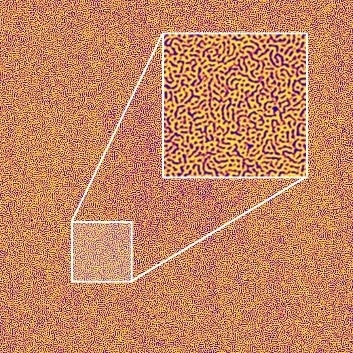
Phase image of styrene-butadiene block copolymer (SBC), collected in TappingMode with an RTESPA probe. Full scan size is 5000 × 5000 µm, 2560 × 2560 px. Inset is a digital zoom showcasing the data density and level of detail retained. Image Credit: Bruker Nano Surfaces and Metrology
Offers future versatility and customization
The Dimension Nexus is designed with open-access features to support experiment customization. The probe-sample junction is physically accessible, allowing for electrical connections and other custom accessories to be attached. The NanoScope 6 controller further enhances flexibility by offering an open hardware and software platform with front-panel BNC connectors, scripting software options, and seamless data import to Python for tailored analyses.
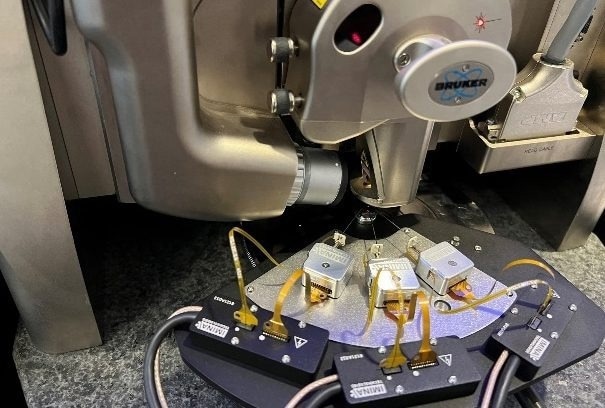
Microprobers integrated with Dimension Nexus for electrical characterization of nanodevices. Image Credit: Bruker Nano Surfaces and Metrology
Applications
Enables a full range of applications
Equipped with a 150 mm open-access programmable stage and compatibility with over 50 of Bruker's modes, including full PeakForce Tapping capabilities, fluid imaging, environmental control, and more, the Nexus offers affordable AFM excellence for a diverse range of applications and experiments, including:
- Characterizing graphene, moiré superlattices, and other 2D materials at the nanoscale
- Mapping nanomechanical properties of polymers and composite materials
- Correlating structural and ferroelectric properties of perovskites in photovoltaics
- Quantifying nanoscale surface roughness of semiconductor thin films and substrates
- Carrying out in-situ and operando studies of the local electrochemical activity of lithium-ion batteries
- Manipulating and analyzing the electrical properties of DNA nanowires for nanoelectronic devices
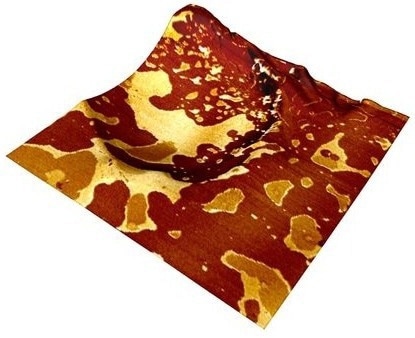
PeakForce quantitative nanomechanics (PeakForce QNM®) can be used to map distribution of components in polymer blends. PS-PMMA-PVC sample courtesy of U. Mons. Scan size 5 × 5 µm, RTESPA-150 probe. Image Credit: Bruker Nano Surfaces and Metrology
Specifications
Dimension Nexus select specifications
Source: Bruker Nano Surfaces and Metrology
| |
|
| X-Y Scan Range |
90 μm x 90 μm typical, 85 μm minimum |
| Z Range |
10 μm typical in imaging and force curve modes, 9.5 μm minimum |
| Sample Size/Holder |
150 mm vacuum chuck for samples, ≤150 mm diameter, ≤15 mm thick |
| Motorized Positioning (XY Stage) |
150 mm x 150 mm inspectable area; 6 μm repeatability, bidirectional; programmable for multi-site measurements |
| Microscope Optics |
5 MP digital camera; 180 μm to 1465 μm viewing area; digital zoom and motorized focus |
| Certification |
CE |
What Dimension AFM is right for you?
Bruker offers an extensive selection of advanced AFM systems renowned for their high quality. Dimension AFMs integrate state-of-the-art nanoscale imaging and characterization technologies, leveraging decades of AFM innovation and close partnerships with users. The Dimension Icon, serving as the flagship model, sets the benchmark for performance in the commercial AFM market. Complementing this lineup, the Dimension Nexus delivers outstanding functionality and value, presenting a more budget-friendly AFM option.
The key features and capabilities distinguishing these two premium systems are compared below.
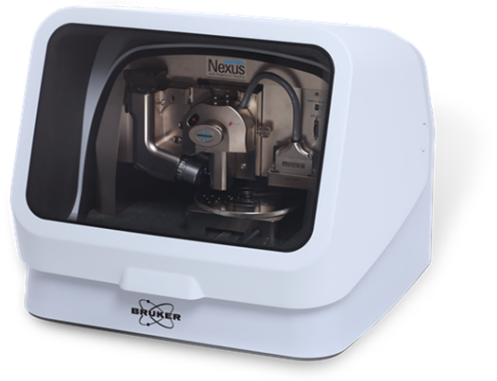
NEWDimension Nexus - best-in-class general purpose AFM. Image Credit: Bruker Nano Surfaces and Metrology
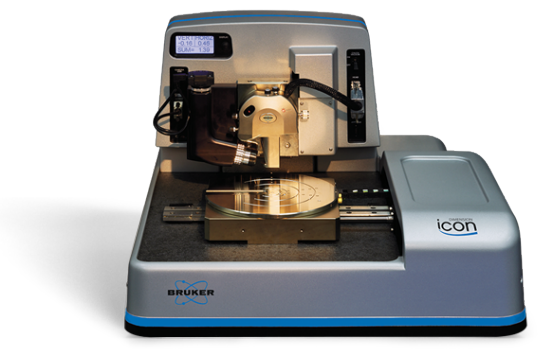
Dimension Icon - gold standard for advanced large-sample AFMs. Image Credit: Bruker Nano Surfaces and Metrology
Key features and specs
Source: Bruker Nano Surfaces and Metrology
| |
Dimension Nexus |
Dimension Icon |
| Sample Size (XY) |
150 mm |
300 mm |
| Motorized Stage Range |
150 mm x 150 mm |
150 mm x 180 mm |
| Small & Multi-Sample Compatibility |
Yes |
Yes |
| Sample Flexibility |
Tip Scanner |
Tip Scanner |
| XY-Scan Range |
90 µm x 90 µm |
90 µm x 90 µm |
| Z-Range |
10 µm |
10 µm |
| System Footprint (W x L) |
24" x 32" (plus customer desk/workstation) |
47" x 94" (including integrated workstation) |
| Controller |
NanoScope 6 |
NanoScope 6 |
| Programmable Measurements |
Yes |
Yes |
| Automated Metrology Recipes |
No |
Yes |
| Open-Access Platform |
High degree of flexibility for customization |
Maximum flexibility for customization |
Measurement capabilities
Source: Bruker Nano Surfaces and Metrology
| |
Dimension Nexus |
Dimension Icon |
| High-Resolution Imaging |
Atomic lattice resolution |
Atomic defect resolution |
| High-Speed Imaging |
Fast Tapping |
FastScan dedicated high-speed AFM; Fast Tapping |
| PeakForce Tapping |
Yes |
Yes |
| ScanAsyst (Self-Optimizing Imaging) |
Yes |
Yes |
| PeakForce Tapping Derivative Modes |
Yes |
Yes |
| Chemical Identification Capability |
No |
IconIR upgradable |
| Hyperspectral Imaging |
DataCube |
DataCube |
| Other Modes & Options |
Wide range to address majority of applications |
Complete range for industry-leading application coverage |
Accessories
Enhance the Bruker AFM
Bruker AFM probes
The online store offers a diverse selection of AFM probes, cantilevers, and accessories. Each probe reflects Bruker's extensive expertise in atomic force microscopy.
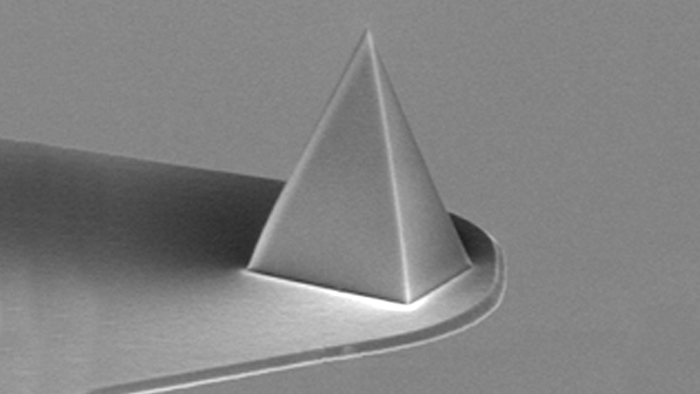
Image Credit: Bruker Nano Surfaces and Metrology
Software
Powered by the NanoScope 6 AFM controller
The NanoScope 6 controller delivers enhanced speeds, reduced noise, and increased flexibility for AFM modes, enabling optimal performance with Dimension and MultiMode AFM systems. This next-generation controller offers exceptional accuracy, precision, and adaptability for nanoscale surface measurements across various applications.
NanoScope 6 uniquely enables Bruker AFMs to:
- Access a wider range of imaging modes than competing systems, including exclusive and advanced AFM modes requiring intricate control and analysis.
- Obtain precise, quantitative data for nanoelectrical and nanomechanical property measurements across all applications.
- Fine-tune and personalize scanning parameters to address the most challenging research and industrial measurement needs.
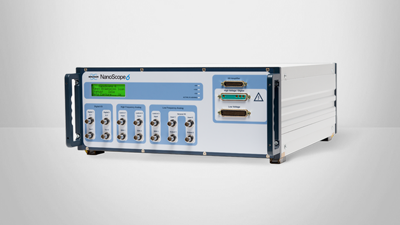
Image Credit: Bruker Nano Surfaces and Metrology